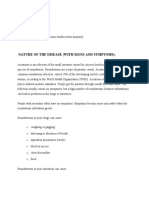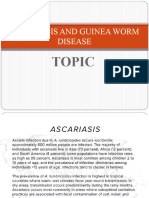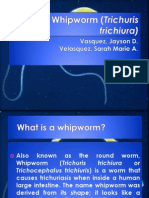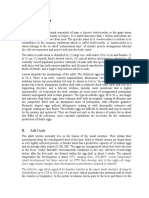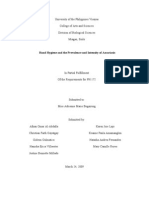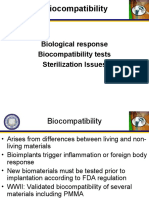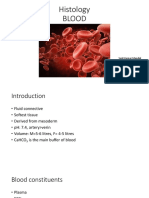Ascariasis 2
Ascariasis 2
Uploaded by
Aisya AliasCopyright:
Available Formats
Ascariasis 2
Ascariasis 2
Uploaded by
Aisya AliasOriginal Title
Copyright
Available Formats
Share this document
Did you find this document useful?
Is this content inappropriate?
Copyright:
Available Formats
Ascariasis 2
Ascariasis 2
Uploaded by
Aisya AliasCopyright:
Available Formats
Facts about ASCARIASIS
What is ASCARIASIS?
ASCARIASIS is a disease caused by parasitic roundworm Ascaris lumbricoides. Ascaris, hookworm, and whipworm are known as soil-transmitted
helminths (parasitic worms). Ascariasis is the most common helminthic
infection, with an estimated worldwide prevalence of 25% (0.8-1.22 billion
people).
Where is Ascaris lumbricodes being found?
Ascaris lives in the intestine and Ascaris eggs are passed in the feces of infected persons. If the infected person defecates outside (near bushes, in a garden, or field) or if the feces of an infected person are used as fertilizer, eggs are deposited on soil.
How do people get the Ascariasis?
People is expose to Ascaris lumbricoides when they are incidentally ingest the embryonated (infective) eggs
in faeces found in contaminated soil or food. Both infective stage and diagnosis stage are eggs of the parasite. After oral ingested the parasite by humans, the eggs may hatch in small intestine and release larvae.
The larvae may migrate to lungs, heart, kidney, or brain.
How it being diagnosed?
What are the symptoms of ASCARIASIS?
For people who are having symptoms of Ascariasis,
they may undergo several diagnosis to confirm the
disease. The diagnosis that they may try are such as
below:
People infected with Ascaris often show no symptoms. If symptoms do occur they can be light and
include abdominal discomfort. Heavy infections
can cause intestinal blockage and impair growth in
children. Other symptoms such as cough are due to
migration of the worms through the body.
Stool microscopy using wet mount method;
Eosinophilia, where peripheral eosinophilia
can be found during migration of parasite
through the lungs;
Ultrasound examination may help to diagnose hepatobiliary or pancreatic ascariasis;
Kato katz technique
How can I prevent it?
Avoid contact with soil that may be contaminated with human feces,
including with human fecal matter ("night soil") used to fertilize crops.
Wash your hands with soap and warm water before handling food.
Teach children the importance of washing hands to prevent infection.
Wash, peel, or cook all raw vegetables and fruits before eating, particularly those that have been grown in soil that has been fertilized with
manure.
What should I do if I think I might have Ascariasis?
If you think you might have Ascariasis, you should see medical provider for further action.
REFERENCES
Dora-Laskey, A. (2014, November 21). Ascaris lumbricoides. Retrieved from http://emedicine.medscape.com/article/788398 overview#a5,Lora, J. (2005, June). Ascariasis. Retrieved from http://web.stanford.edu/group/parasites/ParaSites2005/Ascaris/
JLora_ParaSite.htm.,Vyas, J. M. (2014, July 12). Ascariasis. Retrieved from https://www.nlm.nih.gov/medlineplus/ency/
article/000628.htm., CDC. (2013, January 10). Ascaris FAQs. Retrived from http://www.cdc.gov/parasites/ascariasis/gen_info/
faqs.html.,Bethony J, Brooker S, Albonico M, Geiger SM, Loukas A, Diemert D, et al. Soil-transmitted helminth infections: ascariasis,
trichuriasis, and hookworm. Lancet. 2006 May 6. 367(9521):1521-32. ,CDC. (2013, January 10). Parasites Ascariasis. Retrieved from
http://www.cdc.gov/parasites/ascariasis/index.html
You might also like
- Mss DanyarDocument12 pagesMss DanyarBanu HussienNo ratings yet
- Ascaris Lives in The Intestine and Ascaris Eggs Are Passed in The Feces of Infected Persons. IfDocument1 pageAscaris Lives in The Intestine and Ascaris Eggs Are Passed in The Feces of Infected Persons. IfNurHasanahHusnussuluukiNo ratings yet
- CDC - Ascariasis - General Information - Frequently Asked Questions (FAQs)Document2 pagesCDC - Ascariasis - General Information - Frequently Asked Questions (FAQs)janiceli0207No ratings yet
- PARASITES ReportDocument7 pagesPARASITES ReportTaha JasimNo ratings yet
- AscariasisDocument10 pagesAscariasisMiraNo ratings yet
- Ascari As IsDocument16 pagesAscari As IsCici Novelia ManurungNo ratings yet
- Defecating in The Morning, Because The Gravid Female Worms Usually Migrate at Night To The Perianal Region To Deposit EggsDocument4 pagesDefecating in The Morning, Because The Gravid Female Worms Usually Migrate at Night To The Perianal Region To Deposit EggsDaniella TupasNo ratings yet
- Ascariasis: The Disease and How It Affects PeopleDocument2 pagesAscariasis: The Disease and How It Affects PeopleAtrioventrikular MilanistiNo ratings yet
- AscariasisDocument6 pagesAscariasisPika PearlasNo ratings yet
- AscariasisDocument6 pagesAscariasisbhelle11No ratings yet
- Ascaris InstructorDocument7 pagesAscaris InstructorLinna Asni ZalukhuNo ratings yet
- Ascaris 3Document13 pagesAscaris 3Rajanikanta MahatoNo ratings yet
- Parasitic Roundworm DiseaseDocument53 pagesParasitic Roundworm DiseaseRaja Alfian IrawanNo ratings yet
- Ascariasis WhoDocument3 pagesAscariasis WhoNurul FajriNo ratings yet
- Nature of The Disease (With Signs and Symptoms)Document3 pagesNature of The Disease (With Signs and Symptoms)Mhayalene DiamanteNo ratings yet
- Ascariasis: Roundworm Ascaris LumbricoidesDocument18 pagesAscariasis: Roundworm Ascaris LumbricoidesSuneel Kumar PrajapatiNo ratings yet
- Parasitiology Semi ExamDocument26 pagesParasitiology Semi ExamHILVANO, HEIDEE B.No ratings yet
- Ascaris LumbricoidesDocument10 pagesAscaris LumbricoidesMaxamed xasanNo ratings yet
- Nec at or American UsDocument4 pagesNec at or American UsAngelina CharlieNo ratings yet
- Ascariasis: MSD Manual Professional VersionDocument3 pagesAscariasis: MSD Manual Professional VersionMr BrewokNo ratings yet
- AscariasisDocument1 pageAscariasissandiNo ratings yet
- Ascari As IsDocument4 pagesAscari As IsHassan osmanNo ratings yet
- Diseases & Conditions: Contact Us AppointmentsDocument14 pagesDiseases & Conditions: Contact Us AppointmentsRohit Kumar AllaparthiNo ratings yet
- AscariasisDocument7 pagesAscariasisMia Angela Del MundoNo ratings yet
- Ascariasis - UpToDateDocument25 pagesAscariasis - UpToDateMiclăuș GeorgeNo ratings yet
- Ascaris Lumbricoides Is The Largest Nematode (Roundworm) Parasitizing The HumanDocument4 pagesAscaris Lumbricoides Is The Largest Nematode (Roundworm) Parasitizing The HumannurNo ratings yet
- Ascariasis: Bambi CarrinoDocument14 pagesAscariasis: Bambi CarrinoBambi CarrinoNo ratings yet
- Ilovepdf MergedDocument336 pagesIlovepdf MergedariancristinemaeellagaNo ratings yet
- Hookworms: in Animals - in HumansDocument1 pageHookworms: in Animals - in HumansCaleb VoosNo ratings yet
- Phylum NematodaDocument16 pagesPhylum NematodakeishyaaacarlosNo ratings yet
- General Parasitology L2Document27 pagesGeneral Parasitology L2kayse abtidoonNo ratings yet
- The Ultimate Parasite Cleanse FlipbookDocument39 pagesThe Ultimate Parasite Cleanse FlipbookTharun Karra100% (2)
- Ministry of Higher Education and Science Research Sulaimani Polytechnic University Kalar Technical Institute ..Department SubjectDocument20 pagesMinistry of Higher Education and Science Research Sulaimani Polytechnic University Kalar Technical Institute ..Department Subjectsoran najebNo ratings yet
- Bahsakam KotaeyDocument19 pagesBahsakam Kotaeysoran najebNo ratings yet
- ASCARSISDocument39 pagesASCARSISkajal thakurNo ratings yet
- Chapter 15 NematodesDocument73 pagesChapter 15 NematodesNicole NipasNo ratings yet
- Hookworm RephraseDocument6 pagesHookworm Rephrasecooky maknaeNo ratings yet
- Ascaris LEM 2022Document36 pagesAscaris LEM 2022Kenny NgowiNo ratings yet
- Ascaris Lumbricoides NotesDocument4 pagesAscaris Lumbricoides NotesrositasholekhaNo ratings yet
- Whipworm (Trichuris Trichiura)Document28 pagesWhipworm (Trichuris Trichiura)Anonymous HXLczq3No ratings yet
- Trichiura), and Hookworm (Anclostoma Duodenale and Necator Americanus) - ADocument4 pagesTrichiura), and Hookworm (Anclostoma Duodenale and Necator Americanus) - ADianNo ratings yet
- Ascari As IsDocument2 pagesAscari As IsShainaricci BorjaNo ratings yet
- Ascaris Lumbricoides: I. MorphologyDocument6 pagesAscaris Lumbricoides: I. MorphologyJoseline SorianoNo ratings yet
- Aljas&Bama (Microbm9evaluate)Document8 pagesAljas&Bama (Microbm9evaluate)Mary Clare Fuentes BamaNo ratings yet
- Hand Hygiene and The Prevalence and Intensity of AscariasisDocument19 pagesHand Hygiene and The Prevalence and Intensity of AscariasisHanisha EricaNo ratings yet
- Parasitic InfectionsDocument6 pagesParasitic Infectionsmuhammedutme19No ratings yet
- Cleanup Run Me FirstDocument12 pagesCleanup Run Me FirstJesus BerriosNo ratings yet
- Worm ParasitesDocument3 pagesWorm Parasitespaolospadera72No ratings yet
- Soil-Transmitted Helminth InfectionsDocument7 pagesSoil-Transmitted Helminth InfectionsDiane GaliNo ratings yet
- Hookworm Disease: Ancylostoma Duodenale-Are Anthropophilic Human Hookworms Transmitted From Infected SoilDocument5 pagesHookworm Disease: Ancylostoma Duodenale-Are Anthropophilic Human Hookworms Transmitted From Infected SoilBrix Valdriz100% (1)
- Topic: Nematodes: Melanie P. Cortez Discussant Glenda D.Abad ProfessorDocument30 pagesTopic: Nematodes: Melanie P. Cortez Discussant Glenda D.Abad ProfessorMelanie perez cortezNo ratings yet
- Community Health Nursing: Instructor MR - Bashar Qasho'o St. Name: Bassam N. Hariri ID: 20710486Document12 pagesCommunity Health Nursing: Instructor MR - Bashar Qasho'o St. Name: Bassam N. Hariri ID: 20710486Bassam Naif HaririNo ratings yet
- Infectious Diseases of Raccoons: WWW - Cdc.govDocument1 pageInfectious Diseases of Raccoons: WWW - Cdc.govJoderNo ratings yet
- Zoology AscriseDocument12 pagesZoology AscrisepappunaagraajNo ratings yet
- Ascari As IsDocument20 pagesAscari As IsDeladem EmmanuelNo ratings yet
- Ectoparasites of ReptilesDocument8 pagesEctoparasites of ReptilesJohnLyndonLunnayNo ratings yet
- Project IN Parasitology: Submitted To: Dr. Ed de Vera Submitted By: Francesca Angela Nervar BSN - 2Document38 pagesProject IN Parasitology: Submitted To: Dr. Ed de Vera Submitted By: Francesca Angela Nervar BSN - 2Catherine MetraNo ratings yet
- Ancylostoma DuodenaleDocument5 pagesAncylostoma Duodenalegrafei pennaNo ratings yet
- AutoimmunityDocument8 pagesAutoimmunityRachit NarangNo ratings yet
- C-Reactive Protein (CRP)Document9 pagesC-Reactive Protein (CRP)Ibrahim Alturaiki100% (1)
- HBeAg ARCDocument6 pagesHBeAg ARCtesteste testeNo ratings yet
- Non Specific DefenseDocument27 pagesNon Specific Defensededhi yustendi ternakNo ratings yet
- Vaccination-Status TeachersDocument2 pagesVaccination-Status TeachersThyra PastorNo ratings yet
- Catalogue DengueElisaRangeDocument6 pagesCatalogue DengueElisaRangeedrinsneNo ratings yet
- Drug Study CHNDocument3 pagesDrug Study CHNelijahdale.guillergan-05No ratings yet
- Prioritization of Mabs During Resource Shortages 20211229Document3 pagesPrioritization of Mabs During Resource Shortages 20211229News10NBCNo ratings yet
- SVLT Lab Report DetailsDocument2 pagesSVLT Lab Report Detailsaman.dubey.resNo ratings yet
- Handouts - 6BIOM002W.2 - Inflammation 2018-9 PDFDocument66 pagesHandouts - 6BIOM002W.2 - Inflammation 2018-9 PDFFatima HusseinNo ratings yet
- IMMUNOPROPHYLAXISDocument30 pagesIMMUNOPROPHYLAXISAli TARARNo ratings yet
- Makalah Lengkap Acute Pancreatitis As The Initial Presentation in Systemic Lupus ErythematosusDocument13 pagesMakalah Lengkap Acute Pancreatitis As The Initial Presentation in Systemic Lupus ErythematosuspudjoNo ratings yet
- Seminar On Anaphylaxis 7-6-12Document70 pagesSeminar On Anaphylaxis 7-6-12LIDIYA MOL P VNo ratings yet
- Lichen Planus, Nitidus, Striatus, Sclerosus (Dr. Cruz)Document9 pagesLichen Planus, Nitidus, Striatus, Sclerosus (Dr. Cruz)Riena Austine Leonor NarcillaNo ratings yet
- SyphllisDocument23 pagesSyphllisMohammad AkkadNo ratings yet
- Supercare Medical Services, Inc. Health Declaration Form: Remarks of Examining PhysicianDocument1 pageSupercare Medical Services, Inc. Health Declaration Form: Remarks of Examining PhysicianJunexielJalop100% (1)
- Health 8 Q3 3 Common Communicable DiseasesDocument24 pagesHealth 8 Q3 3 Common Communicable DiseasesKimberly TanalasNo ratings yet
- Irvines ChickenTalk Dec2010Document28 pagesIrvines ChickenTalk Dec2010Hadrien FaryalaNo ratings yet
- ISLAB P2 - Anti-Streptolysin ODocument4 pagesISLAB P2 - Anti-Streptolysin ODanielle Anne LambanNo ratings yet
- Blood Product CompatibilityDocument6 pagesBlood Product CompatibilityTina MooreNo ratings yet
- Human Health & DiseaseDocument58 pagesHuman Health & DiseaseSujay TewaryNo ratings yet
- Biocompatibility: Biological Response Biocompatibility Tests Sterilization IssuesDocument41 pagesBiocompatibility: Biological Response Biocompatibility Tests Sterilization Issuesbagus3869No ratings yet
- Aso TestDocument7 pagesAso TestYOGANANTH mscasNo ratings yet
- Histology Blood: Sujit Kumar Mandal NaihsDocument30 pagesHistology Blood: Sujit Kumar Mandal NaihsSujit MandalNo ratings yet
- Kolaeva NotesfsdffDocument16 pagesKolaeva NotesfsdffsharenNo ratings yet
- Immunopharmacology - IntroductionDocument51 pagesImmunopharmacology - IntroductionIsrat Jahan Surovy 2225400672No ratings yet
- Nature of Non-Communicable Disease (NCD)Document17 pagesNature of Non-Communicable Disease (NCD)Teofian Amparo LuibNo ratings yet
- Virology MCQ 1Document21 pagesVirology MCQ 1Robert Edwards100% (10)
- Gape WormDocument4 pagesGape WormNjoku IykeNo ratings yet
- SE05Document3 pagesSE05Pranavpuri GoswamiNo ratings yet














